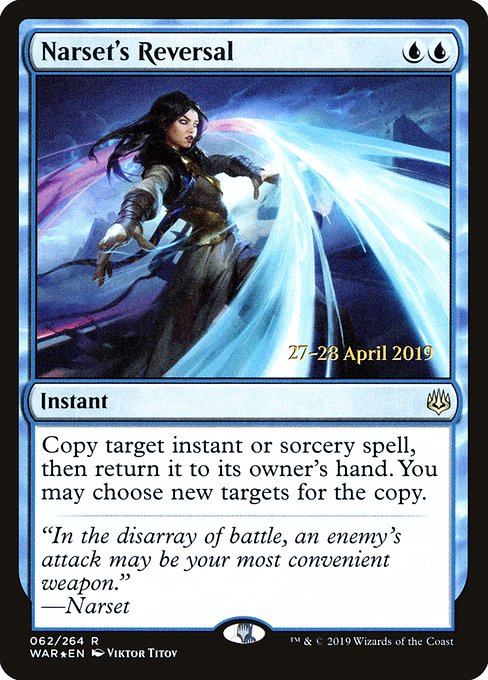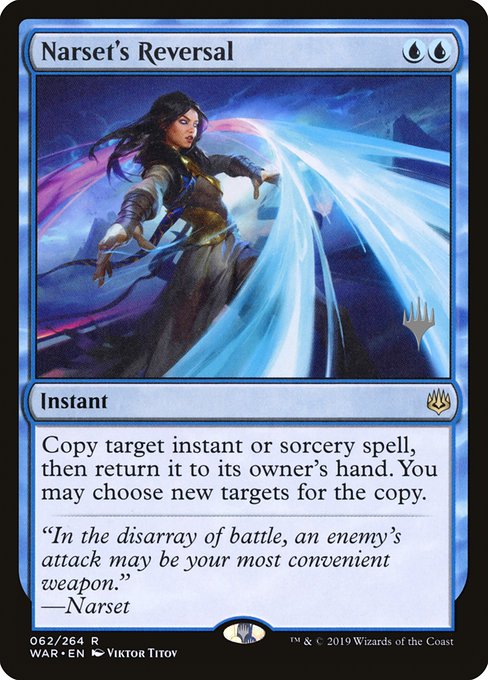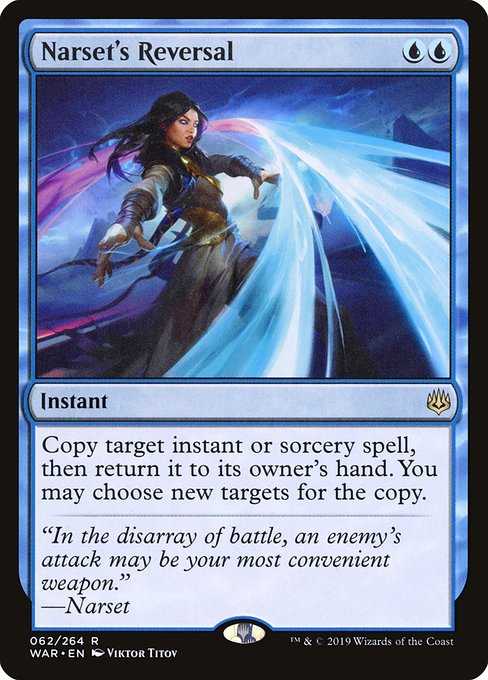standard
future
historic
gladiator
pioneer
explorer
modern
legacy
pauper
vintage
penny
commander
brawl
alchemy
paupercommander
duel
oldschool
premodern
Rulings
The copy is created on the stack, so it’s not “cast.” Abilities that trigger when a player casts a spell won’t trigger.
Narset’s Reversal can copy any instant or sorcery spell, not just one with targets.
The copy will have the same targets as the spell it’s copying unless you choose new ones. You may change any number of the targets, including all of them or none of them. If, for one of the targets, you can’t choose a new legal target, then it remains unchanged (even if the current target is illegal).
If the spell that’s copied has an X whose value was determined as it was cast (like Finale of Promise does), the copy will have the same value of X.
If the spell has damage divided as it was cast, the division can’t be changed (although the targets receiving that damage still can). The same is true of spells that distribute counters.
If you copy a spell, you control the copy. Narset’s Reversal and the copy resolve before the original spell would have resolved.
If the spell that’s copied is modal (that is, it says “Choose one —” or the like), the copy will have the same mode. A different mode can’t be chosen.
The controller of a copy can’t choose to pay any alternative or additional costs for the copy. However, effects based on any alternative or additional costs that were paid for the original spell are copied as though those same costs were paid for the copy.
If a copy of a spell is returned to its owner’s hand, it’s moved there, then it will cease to exist as a state-based action.
If a spell is returned to its owner’s hand, it’s removed from the stack and thus will not resolve. The spell isn’t countered; it just no longer exists. This works against a spell that can’t be countered.
Narset’s Reversal can copy any instant or sorcery spell, not just one with targets.
The copy will have the same targets as the spell it’s copying unless you choose new ones. You may change any number of the targets, including all of them or none of them. If, for one of the targets, you can’t choose a new legal target, then it remains unchanged (even if the current target is illegal).
If the spell that’s copied has an X whose value was determined as it was cast (like Finale of Promise does), the copy will have the same value of X.
If the spell has damage divided as it was cast, the division can’t be changed (although the targets receiving that damage still can). The same is true of spells that distribute counters.
If you copy a spell, you control the copy. Narset’s Reversal and the copy resolve before the original spell would have resolved.
If the spell that’s copied is modal (that is, it says “Choose one —” or the like), the copy will have the same mode. A different mode can’t be chosen.
The controller of a copy can’t choose to pay any alternative or additional costs for the copy. However, effects based on any alternative or additional costs that were paid for the original spell are copied as though those same costs were paid for the copy.
If a copy of a spell is returned to its owner’s hand, it’s moved there, then it will cease to exist as a state-based action.
If a spell is returned to its owner’s hand, it’s removed from the stack and thus will not resolve. The spell isn’t countered; it just no longer exists. This works against a spell that can’t be countered.
Rulings
The copy is created on the stack, so it’s not “cast.” Abilities that trigger when a player casts a spell won’t trigger.
Narset’s Reversal can copy any instant or sorcery spell, not just one with targets.
The copy will have the same targets as the spell it’s copying unless you choose new ones. You may change any number of the targets, including all of them or none of them. If, for one of the targets, you can’t choose a new legal target, then it remains unchanged (even if the current target is illegal).
If the spell that’s copied has an X whose value was determined as it was cast (like Finale of Promise does), the copy will have the same value of X.
If the spell has damage divided as it was cast, the division can’t be changed (although the targets receiving that damage still can). The same is true of spells that distribute counters.
If you copy a spell, you control the copy. Narset’s Reversal and the copy resolve before the original spell would have resolved.
If the spell that’s copied is modal (that is, it says “Choose one —” or the like), the copy will have the same mode. A different mode can’t be chosen.
The controller of a copy can’t choose to pay any alternative or additional costs for the copy. However, effects based on any alternative or additional costs that were paid for the original spell are copied as though those same costs were paid for the copy.
If a copy of a spell is returned to its owner’s hand, it’s moved there, then it will cease to exist as a state-based action.
If a spell is returned to its owner’s hand, it’s removed from the stack and thus will not resolve. The spell isn’t countered; it just no longer exists. This works against a spell that can’t be countered.
Narset’s Reversal can copy any instant or sorcery spell, not just one with targets.
The copy will have the same targets as the spell it’s copying unless you choose new ones. You may change any number of the targets, including all of them or none of them. If, for one of the targets, you can’t choose a new legal target, then it remains unchanged (even if the current target is illegal).
If the spell that’s copied has an X whose value was determined as it was cast (like Finale of Promise does), the copy will have the same value of X.
If the spell has damage divided as it was cast, the division can’t be changed (although the targets receiving that damage still can). The same is true of spells that distribute counters.
If you copy a spell, you control the copy. Narset’s Reversal and the copy resolve before the original spell would have resolved.
If the spell that’s copied is modal (that is, it says “Choose one —” or the like), the copy will have the same mode. A different mode can’t be chosen.
The controller of a copy can’t choose to pay any alternative or additional costs for the copy. However, effects based on any alternative or additional costs that were paid for the original spell are copied as though those same costs were paid for the copy.
If a copy of a spell is returned to its owner’s hand, it’s moved there, then it will cease to exist as a state-based action.
If a spell is returned to its owner’s hand, it’s removed from the stack and thus will not resolve. The spell isn’t countered; it just no longer exists. This works against a spell that can’t be countered.
Your collection? Your decks?
Want to manage your collection and/or create decks?



 0
0
 2.01€
2.01€

